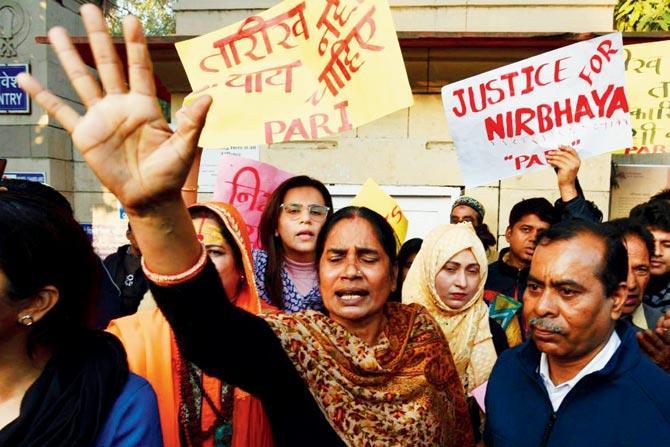Tara Kaushal's experience with sexual harassment and violence coagulates into a multi-media project, including a soon-to-release book, to investigate why men rape, and whether" a lot of men were doing it a little or few men were doing it a lot"

Tara Kaushal
At the age of 12, Tara Kaushal began to dwell on the thought, "Why are the actions of men changing my life?" Her family of three had just relocated to Noida from Mumbai's Navy Nagar. Her extremely liberal parents were suddenly policing what she wore. As she dodged (not always successfully) molesters in public spaces, potential kidnappers in an orbiting van when she walked the dog, she recognised her parents' attempts at keeping her safe.
In 2012, when medical intern Jyoti Singh was gang-raped by six men in a DTC bus in south Delhi, "that could have been me," thought the Juhu-resident. As a student at Jesus and Mary College, she would take a DTC bus to Chanakyapuri. Though she loved her course, her attendance was severely affected by the sexual harassment she fought off on the commute.
By 2016, her thoughts coagulated into a shape—a multi-media project to investigate why men rape, and whether "a lot of men were doing it a little or few men were doing it a lot". The book (published by Harper Collins), after being delayed by the global pandemic, will be out soon. Why Men Rape: An Indian undercover investigation is a pedantic thesis, peppered with asides from the author with unparliamentary acronyms—("I was four, FFS" she writes when her rival asked Kaushal during a college debate what she was wearing when she was first raped). The framework for her project is this definition of rape, 'Penetration of a woman's anus, vagina, urethra by mouth, fingers, penis or an object', and her inquiries cover only 'CIS gender, heteronormative scope'. There are plans to mould the leftover research into another book, a documentary and a platform for online activism.
She crowd-funded the project and set out to understand rapists and the ecosystem that nurtures them. "Do you know a rapist? Do you know someone who has been raped?" she asked social media, NGOs, policemen, private detectives, friends, family and familiars.
She then followed each lead until she reached the name of a rapist and address, and narrowed it to nine names across the country, with diverse religious, socio-economic and geographical backgrounds. One of them had gang-raped a woman whose husband owed his cousin some money; another was a surgeon who raped a teenager he had operated upon, while she was still under anaesthesia, which led to her being paralysed for life; a pillar of a community admitted to raping a 12-year-old out of rage, and a man looking for his ex-wife so he could kill her (she left him after he raped her repeatedly). There's also a list of 72 elite men who have raped.

Delhi bus gang rape deceased Jyoti Singh's mother Asha Devi raises slogans in February this year after a crucial hearing to determine when the four convicts will be hanged was postponed. When the news of the rape broke, Tara Kaushal says she thought, "that could have been me." As a student of Jesus and Mary College, she would take a DTC bus to Chanakyapuri. Pic/ Getty Images
With 250 questions and pretending to be an NRI filmmaker, Kaushal spoke to the rapists in their homes and met their family. The result is compassionate portraits—some of the men suffered extreme violence, intergenerational trauma or neglect at the hands of caregivers from an early age; others bore the brunt of poverty and of being on the lower rungs of the caste system in a rigid community; most came from environments that did not nurture respectful and multi-faceted relationships with women.
"If we demonise the rapist, we render him irredeemable," says the 37-year-old. "If he is 'born bad' then we bear no responsibility for his creation [through culture and nurture]—or his rehabilitation. We are left with only the law-and-order approach, to aim to lock criminals away, which has not been successful. We have to have a prevention-before-cure approach." She also resisted describing the rapes in detail "to ward off voyeuristic interest". Also, the extent of the brutality should not decide whether a rape is traumatic. "All rape is traumatic if you situate it as a violation of human rights and bodily autonomy," she reasons. During their talks, the part of Kaushal's brain always alert to sexual attacks becomes a canary in a coal mine. When Abbas talks about his first and 'pure' love (a girl he has never spoken to) committing suicide, she wonders if his stalking was the trigger. When the wife of a respectable, upper-caste doctor will not leave them alone, in their home, for the interview, she wonders what the man has done to warrant this extreme chaperoning. She notices that several of the men are so aroused by the retelling of their crimes or 'shaitaanis [mischief]' that they can't stop touching themselves. She senses a trap when another man—a pillar of his community—tries to get her to stay the night in their village under the guise of wedding revelry.
In the book, Kaushal dismantles rape into three components: Power, Anger and Sexuality. She also uncovers common rape myths such as 'Rape begets attraction', 'Women want sex all the time', 'To have sex is to rape', 'It becomes rape only if someone finds out', 'There is no rape in marriage or with sex workers', 'A woman will have sex if you convince her (using threats and power)'.
The project was aided by Amit (fictitious name), an ally who understood the essence of her project immediately and helped find subjects, turned into a translator or bodyguard when required, accompanied her to interview them and even lived with them. "He was very jugaadu, approachable and intuitive. He once lived with a subject to draw out information 'man-to-man'," she says. There was also a source lodged in jail and a sub-inspector she coerced into talking to her by hanging outside a police station every day "like a rookie reporter".
By December 2017, nine months into her investigation, Kaushal began suffering from blackouts, would cry excessively, and shout at her husband in her sleep. "We would try to get intimate and Sahil [Mane, her husband] would say, 'I know you are thinking of all those rapes. I can't do this'," she laughs.
Kaushal lives "a feminist life" and is aware she is ensconced in a privilege usually afforded only to men—to be able to focus only on her writing. "I have a chaotic writing routine anyway; I disappear," says Kaushal, "When I'm in the flow, I eat, breathe and sleep the story. I literally sleep in my office. I've reneged on so many marital, familial, social responsibilities, did not wish any of my friends on their birthdays. My friends and family stopped expecting me to show up at social events. I was supported and enabled by everyone around me, starting from my spouse... I was fed, my home chores were taken care of." In 2018, adding to the #MeToo movement online, she named and shamed the editor-in-chief of a broadsheet daily who kissed her while interviewing her for a job.
Where in her early 20s, after years of continuous sexual violence, she believed "all men would rape given the opportunity", she ends the book believing that "all rapists are bad, but they are not devils" and change is possible through comprehensive sex education, rehabilitation and dismantling 'penis privilege'—the specific male privilege to expose the genitalia without consent or consequences—at every step. "Feminism is not a battle between men and women but between the ideologies of patriarchy and human rights," she says.
Catch up on all the latest Mumbai news, crime news, current affairs, and a complete guide from food to things to do and events across Mumbai. Also download the new mid-day Android and iOS apps to get latest updates.
Mid-Day is now on Telegram. Click here to join our channel (@middayinfomedialtd) and stay updated with the latest news
 Subscribe today by clicking the link and stay updated with the latest news!" Click here!
Subscribe today by clicking the link and stay updated with the latest news!" Click here!







